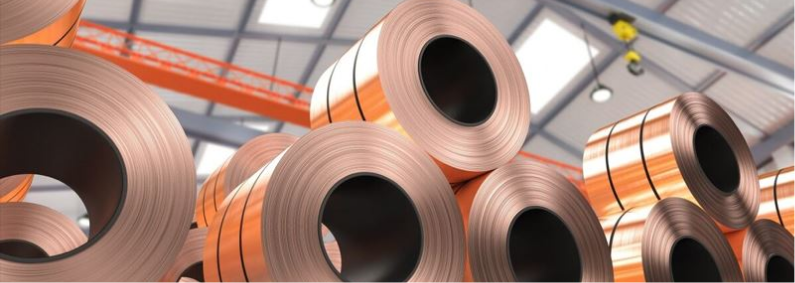Copper

Copper is one of the most versatile and widely used metals, known for its exceptional electrical and thermal conductivity, corrosion resistance, and durability. It is a key material in electrical, plumbing, HVAC, and industrial applications and has been valued for centuries due to its high-performance characteristics and ease of use.
Key Properties of Copper
- High Electrical Conductivity: Copper is the standard for electrical conductivity, often used as a benchmark for comparing other metals. This property makes it essential in wiring, motors, and electrical components.
- Thermal Conductivity: Copper’s high thermal conductivity makes it ideal for heat exchangers, radiators, and cooling systems, efficiently transferring heat in various industrial applications.
- Corrosion Resistance: Copper develops a natural oxide layer, or patina, that protects it from corrosion, especially in moist environments. This makes it suitable for plumbing, roofing, and marine applications.
- Ductility and Malleability: Copper is easy to shape, bend, and form, which is beneficial for applications that require custom shapes or intricate designs.
- Antimicrobial Properties: Copper has natural antimicrobial properties, which makes it useful in medical, food processing, and water treatment applications where hygiene is a priority.
Types of Copper Alloys
Copper alloys are created by adding elements such as zinc, tin, or nickel to enhance certain properties. These alloys extend copper’s application range, providing options for increased strength, corrosion resistance, or other tailored characteristics.
- Brass (Copper-Zinc Alloy): Brass offers enhanced machinability and corrosion resistance, making it suitable for plumbing, decorative fixtures, and musical instruments.
- Bronze (Copper-Tin Alloy): Bronze is stronger than pure copper and resistant to corrosion, often used in marine environments, bushings, bearings, and statues.
- Copper-Nickel Alloys: Known for high corrosion resistance in seawater, copper-nickel is widely used in marine engineering, desalination plants, and offshore oil rigs.
- Beryllium Copper: This alloy is extremely strong and hard while retaining copper’s conductivity, making it suitable for tools, springs, and electronic connectors.
Applications of Copper
- Electrical Wiring and Electronics
- Due to its high electrical conductivity, copper is the standard material for electrical wiring, circuit boards, transformers, and other electronic components.
- Plumbing and HVAC
- Copper pipes are widely used in plumbing for potable water and gas lines due to their corrosion resistance and antibacterial properties. In HVAC, copper’s thermal conductivity makes it ideal for heat exchangers and refrigerant lines.
- Industrial Machinery and Equipment
- Used in bearings, bushings, and industrial tools, copper and its alloys reduce friction and wear, prolonging equipment life.
- Automotive and Aerospace
- Copper is used in radiators, heat exchangers, and brake systems, as well as in wiring for electrical systems in cars and aircraft.
- Architecture and Decorative Arts
- Copper’s aesthetic appeal, durability, and corrosion resistance make it popular in roofing, gutters, and decorative fixtures. It also develops a unique patina over time, adding character to architectural designs.
- Medical and Healthcare Applications
- Copper’s antimicrobial properties are utilized in medical equipment, surfaces in healthcare facilities, and water filtration systems to reduce bacterial growth.
Advantages of Copper
- High Conductivity: Copper’s unmatched electrical and thermal conductivity makes it ideal for electrical, electronic, and heat transfer applications.
- Corrosion Resistance: Copper’s natural patina protects it in harsh environments, extending its service life and reducing maintenance costs.
- Ductility and Ease of Fabrication: Copper’s malleability allows it to be formed into complex shapes, fitting well in intricate or custom applications.
- Recyclability: Copper is 100% recyclable without any loss of performance, supporting sustainable manufacturing practices.
Grades and Standards for Copper
- C11000 (Electrolytic Tough Pitch Copper): High-purity copper used in electrical applications, wiring, and electronics.
- C10100 (Oxygen-Free Copper): Highly conductive and corrosion-resistant, often used in sensitive electronic applications.
- C26000 (Cartridge Brass): An alloy of copper and zinc, ideal for applications requiring machinability and corrosion resistance.
- C70600 (90-10 Copper-Nickel): Known for high resistance to seawater, used in marine and offshore applications.
- C17200 (Beryllium Copper): A strong and hard alloy with excellent conductivity, used in industrial tools, electronics, and springs.
Surface Treatments and Coatings for Copper
- Electroplating: Adds a protective or decorative layer (such as nickel or silver) to copper surfaces, enhancing durability and aesthetics.
- Clear Coating: A transparent coating that protects copper from tarnishing, preserving its appearance.
- Polishing: Provides a smooth, shiny finish for decorative applications, although polished copper may require maintenance to avoid tarnishing.
- Patination: A controlled process that accelerates the formation of a patina, providing an aged look often used in architecture and decorative arts.
Find Quality Copper Solutions for Your Needs
Copper’s unique properties make it indispensable in various industries, from electrical and plumbing to medical and architectural applications. For high-quality copper materials, contact our team to discuss your specific needs. We offer expert guidance to help you choose the best copper grade and finish, ensuring optimal performance and durability in any environment. Reach out today to explore the benefits of copper for your next project.
FAQs
Copper has excellent electrical conductivity, second only to silver, but at a much lower cost, making it the most efficient and economical choice for wiring. Its ductility also makes it easy to work with.
Copper naturally forms a protective oxide layer, or patina, on its surface when exposed to oxygen. This layer prevents further corrosion and extends the metal’s life, especially in moist or marine environments.
Copper is 100% recyclable and retains its original properties through multiple recycling cycles. This makes it a sustainable and eco-friendly choice for industries.

Products
Industry We Serve
- Oil & Gas industries
- Chemical process industries
- Pump and valve in high pressure component
- Food industries
- Pulp and paper industry
- Aerospace industry
- Power plant
- Mechanical component
- Sugar industry
- Cement industry
